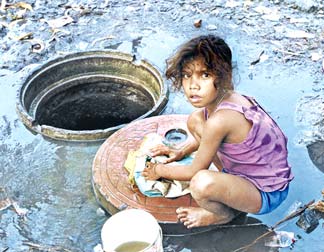Economic crisis will fuel abusive child labour practices -
Experts
The global economic crisis has left growing numbers of children at
risk of abusive and hazardous jobs ranging from prostitution to fighting
in adult wars, US officials warned.
“For the first time since 1930 we’re experiencing a global recession.
Unemployment is surging, the prices for basic food staples are
skyrocketing.
These dire circumstances provide a fertile breeding ground for the
worst forms of child labor,” Senator Tom Harkin said at a conference in
Washington.
|

Child labour - a scourge that should be eliminated |
“Desperate people resort to desperate and degrading measures to
survive, including forcing children into abusive labor,” Harkin said at
the conference convened by US Labor Secretary Hilda Solis to mark the
World Day Against Child Labour.
The roundtable conference fell almost 10 years to the day that the
International Labour Organization (ILO) adopted a convention calling for
urgent action to end the exploitation of children in abusive or
hazardous work including slavery, fighting as combat soldiers,
prostitution and in drug trafficking networks.
Solis said that labour laws tend to “fall by the wayside” in times of
economic crisis and were at risk of doing so now as the world weathered
the worst slump since the Great Depression.
“Across the globe when there are financial crises, you see the
enormous stress placed on government and business and the tendency is to
let labour laws fall by the wayside,” she told AFP.
“When that happens you see more abuses in the workplace and
exploitation of children, and the aim of this conference is to highlight
that and focus on that,” she said, calling the problem of child labour
“systemic.”
Solis announced that the US Labour Department will provide more than
60 million dollars in funding for programs to educate children and give
them vocational training, both key to breaking the cycle of child labour,
while helping their parents find alternatives to sending their children
out to work.
According to the UN labour agency, there are 218 million child
labourers around the world. Nearly half are girls, and more than half of
those girls do hazardous or abusive work: everything from mining to
prostitution.
Child labour is, to a great extent, driven by poverty, the ILO says,
and when poverty is worsened by a slumping economy, more children are
pulled from school and sent out to work, often far from friends and
family.
“Americans find it hard to understand that anyone could send their
child far from home to work,” said Carol Smolenski, director of End
Child Prostitution and Trafficking (ECPAT-USA).
“But what they don’t know is that in some of these countries, 50
percent of kids’ growth is stunted by malnutrition. Kids are literally
starving to death. How can a parent not take the opportunity in
circumstances like those to send their kid out to work?” she said.
The more vulnerable the child is to begin with, either through
poverty or because they live in an abusive family, the more likely they
are to fall into a bad work situation.
“Even in the United States, the kids who are involved in prostitution
and there are many, many 12-, 13- and 14-year-old girls in the adult sex
industry are vulnerable kids,” said Smolenski.
“They’re runaway kids, throw-away kids. Very often they were sexually
abused kids. Pimps are actually looking for girls who have been sexually
abused because, as they say, ‘These girls have been raped so many times,
it’s my job to teach them they might as well get paid for it,’” she
said.
Among the speakers at the conference was 27-year-old Gabriel Kou
Solomon, who was kidnapped by rebel forces in southern Sudan at the age
of six and held by them for four years.
They taught him and other children to “shoot guns and do
reconnaissance,” priming them to be soldiers in Sudan’s long civil war.
“No child should ever go through what I did,” Solomon told AFP at the
conference which gathered dozens of officials, business representatives,
a filmmaker and members of non-governmental organizations, whom Solis
called on to work together to beat child labour.
AFP |



